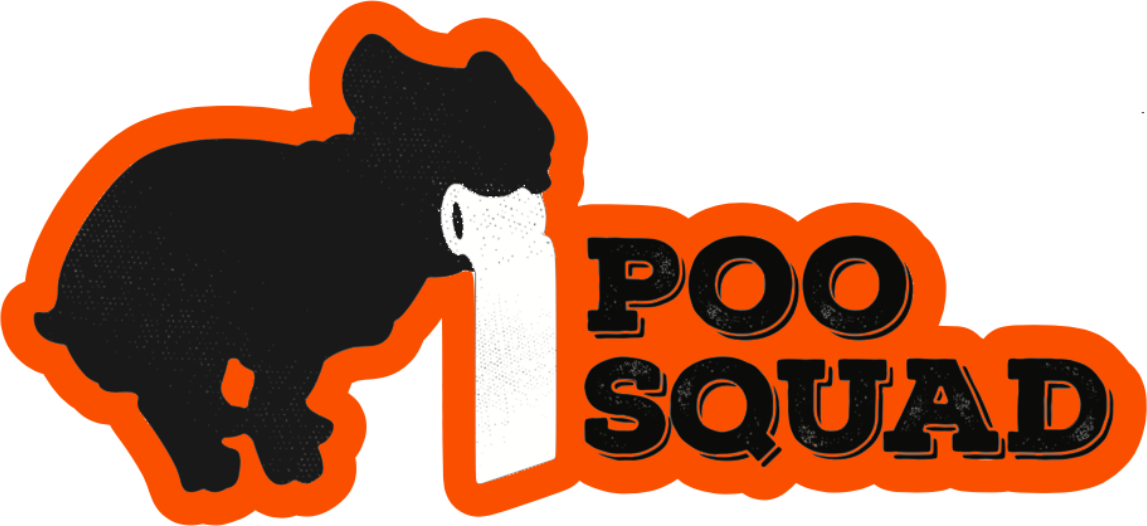Most medium-sized dogs poop 1 to 3 times a day. That’s considered healthy, as long as it’s consistent. Frequency can shift based on your dog’s age, diet, exercise, stress, and hydration levels. A sudden spike, skipped day, or visible stool change is often your first clue something’s off, even before symptoms show.

This guide breaks down exactly what you need to know:
What You’ll Learn: A Step-by-Step Breakdown
What’s Considered Normal Dog Poop Frequency?
Most medium-sized dogs poop between one and three times a day. But that’s not a one-size-fits-all rule. Factors like food quality, how much your dog moves, and even daily routines can shift what’s “normal.” The key is consistency and recognizing when something changes without explanation.
Vet-Backed Guidelines for Medium Dogs
Veterinarians generally agree that 1–3 bowel movements per day is healthy for medium breeds. This assumes your dog is on a balanced diet, getting exercise, and is not dealing with stress, illness, or sudden food changes. Regularity matters more than hitting a magic number.
Is Once a Day Enough?
If everything else looks good. Solid, brown, well-formed stool once per day usually means your dog’s digestive system is working efficiently. That said, if your dog typically poops three times a day and drops to one without any diet or routine changes, it may be worth keeping an eye on.
Many of our residential clients rely on us not only for poop pickup, but as the unofficial early warning system for their pets. If there’s ever a drop-off or spike in poop volume, we notice it, and we let them know.
What Affects How Often Your Dog Poops?
Your dog’s poop schedule is not random. It’s shaped by everything from what they eat to how much they move, and yes, even how hydrated they are. Understanding these factors helps you know what’s typical for your pup and when something’s worth a closer look.
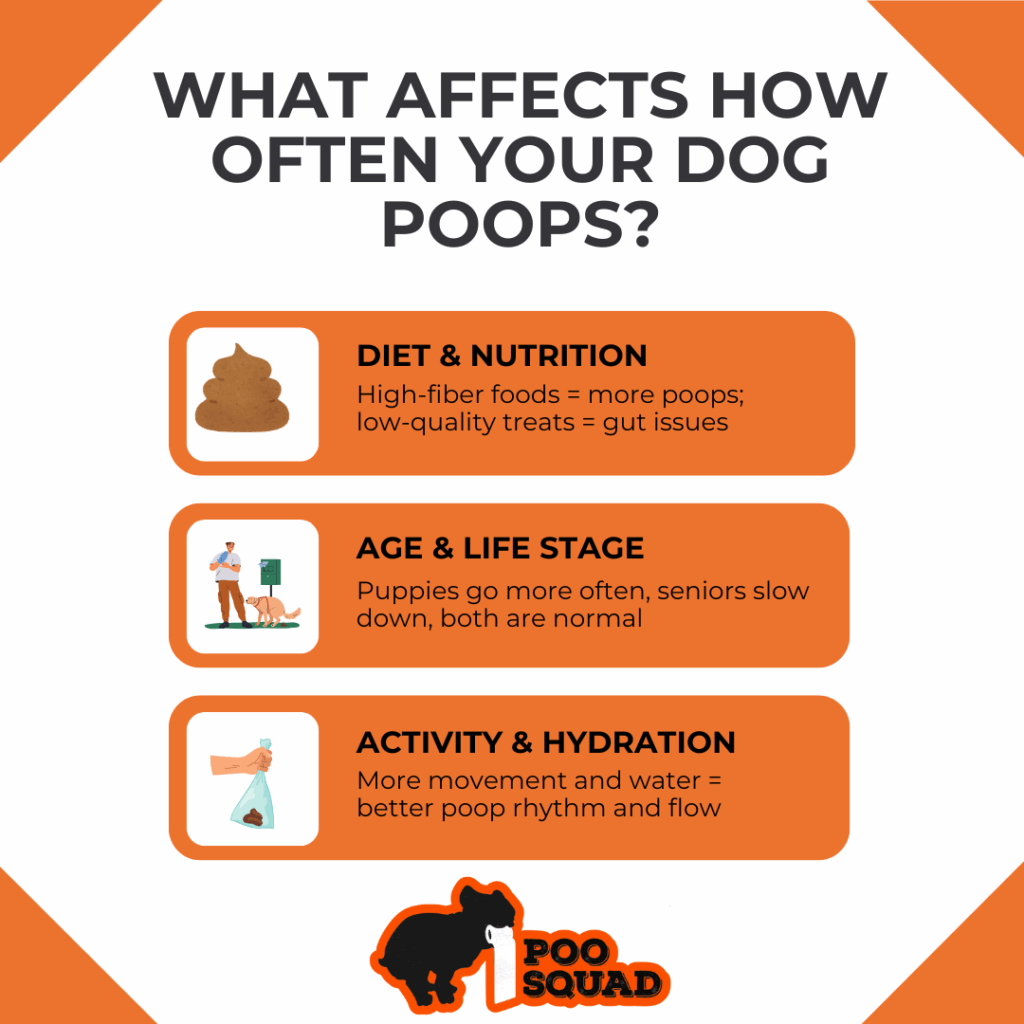
Diet & Nutrition
Food quality and content matter. High-fiber diets can increase frequency, while calorie-dense, low-fiber foods may reduce it. Overfeeding also leads to more frequent or larger stools, often signaling that not all nutrients are being absorbed. If you’ve recently switched foods and noticed a change, that’s likely the reason.
We’ve even seen some dogs develop “pudding pup” syndrome after too many cheap treats, soft, messy stools that don’t scoop up well, and often indicate gut inflammation.
Age & Life Stage
Puppies can go four or five times a day, while senior dogs may only go once. That’s normal. Puppies eat more often and have faster metabolisms. Older dogs slow down, inside and out. But sudden changes, like a senior dog skipping days or a puppy going constantly, might point to something deeper.
Activity & Routine
Regular movement keeps the digestive system on schedule. Dogs that lounge all day tend to have slower bowels. Dogs that get daily walks or zoomie time in the yard usually have more consistent, healthy poops. Many of our clients tell us their pups poop right after they get that 8 am service reminder, because dogs thrive on routine.
Water Intake & Hydration
Hydration keeps things moving. When dogs don’t drink enough, especially after exercise or on hot days, they’re more likely to get constipated.
In our service notes, we often spot this pattern: dry, hard stools followed by a poop-free day or two. Keeping your dog hydrated helps avoid that cycle.
Signs Your Dog’s Pooping Pattern Is a Red Flag
Even the most regular dogs can throw you a curveball now and then. The key is knowing when to chalk it up to a one-off and when it might be time to look deeper. Sudden changes, frequency extremes, or poop that looks “off” are your early clues.
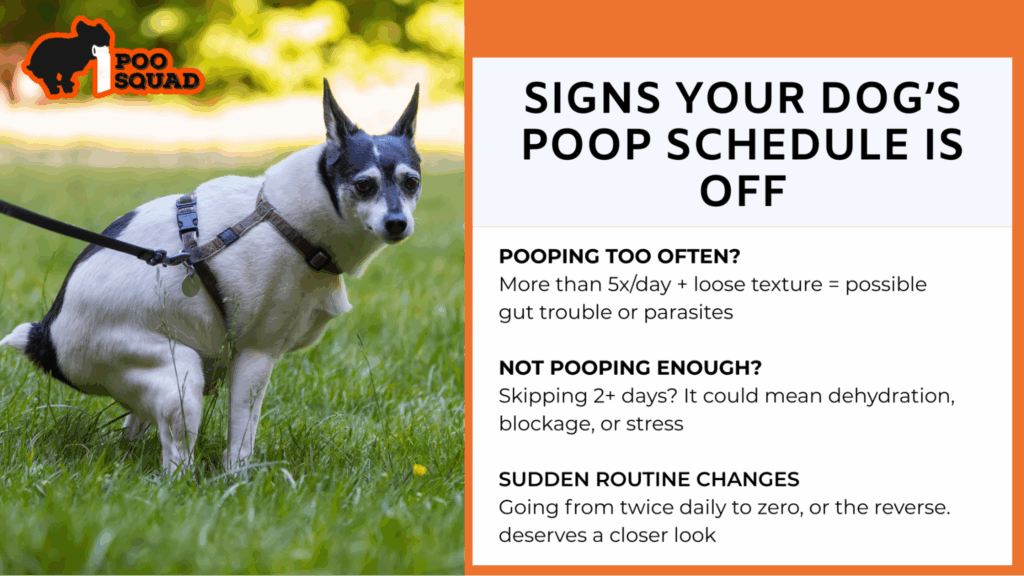
When to Worry About Too Much Pooping
If your dog is pooping more than five times a day, and the stool is loose, smelly, or looks rushed through their system, that may be a red flag. It can indicate stress, parasites, diet issues, or even a more serious gut condition. If it lasts more than a day or two, it’s time to consult a vet.
This is one of the reasons we created the Dog Poop Report Card. When you never see the poop, you might not know it’s an issue, until we show you.
When Pooping Too Little Is a Concern
Going a full day without pooping is not unusual now and then. But if your dog skips more than 36–48 hours, especially if they’re still eating normally, something could be off. Blockages, dehydration, or a slowdown in gut movement are possible culprits. Watch for straining, lethargy, or bloating.
Sudden Changes in Frequency
If your dog normally goes twice a day and suddenly doesn’t poop at all for two days, or flips to five times a day, it’s worth paying attention. Changes in routine, diet, or stress levels could be to blame, but sometimes it’s their body giving them an early warning. We track this closely during our scheduled scooping visits, and our clients appreciate the heads-up when something’s off.
Why We Track Dog Poop Patterns Closely
To most people, poop is something to clean up. To us, it’s a health snapshot. That’s why we don’t only scoop and go, we document what we see. Patterns, changes, and even funny surprises can give dog owners critical information before something becomes serious.
The Poop Report Card Explained
Every visit we make comes with eyes on the ground, literally. If something looks strange, our team notes it in the Dog Poop Report Card and sends it your way. Whether it’s soft stool, bright colors, or foreign objects, we don’t bag it and forget it.
This kind of proactive feedback is why so many clients rely on our residential scooper service as their front line in pet health.
Internal Lingo for Poop Types
We’ve coined terms like “pudding pups” (chronic diarrhea), “poocassos” (dogs who eat crayons or socks), and “waddling bandits” (those who drop nuggets across the whole yard).
These aren’t only jokes, they help us explain poop behavior quickly and clearly. When you hear these terms from us, you’ll know exactly what we mean and why it matters.
Health & Environmental Risks of Skipping Poop Pickups
Leaving dog poop in the yard is not only unpleasant, it can also harm your dog, your lawn, and your local ecosystem. We’ve cleaned up yards where the buildup was causing more problems than clients realized. Here’s why staying on top of it matters more than you think.
Harmful Bacteria and Lawn Damage
One gram of dog poop can contain over 23 million bacteria. That’s not compost, it’s contamination. Left to sit, poop leeches ammonia and pathogens into the soil, killing grass and potentially making your yard unsafe for barefoot kids and curious pups alike.
Why Mowing Over Poop Makes Things Worse
We hear this a lot: “I mow over it.” Please don’t. Chopping up poop with a lawnmower doesn’t make it disappear, it sprays bacteria across your lawn and embeds it into your soil. It also ruins your mower over time. Our sanitation and deodorizing services are a much safer solution.
Cold Months Create a Hidden Mess
In colder seasons, many clients stop noticing the buildup. By the time spring rolls around, they’re facing a poop thaw of epic proportions. That’s why many families opt for year-round service, so they’re not stuck dealing with three months of frozen “yard landmines” when things warm up.
Pro Tips to Keep Your Dog’s Bowel Routine Healthy
If your goal is to keep your dog pooping like clockwork (and avoid the surprises), a few simple habits can go a long way. Routine is everything. When dogs eat well, move daily, and stay hydrated, their digestive health usually follows suit.
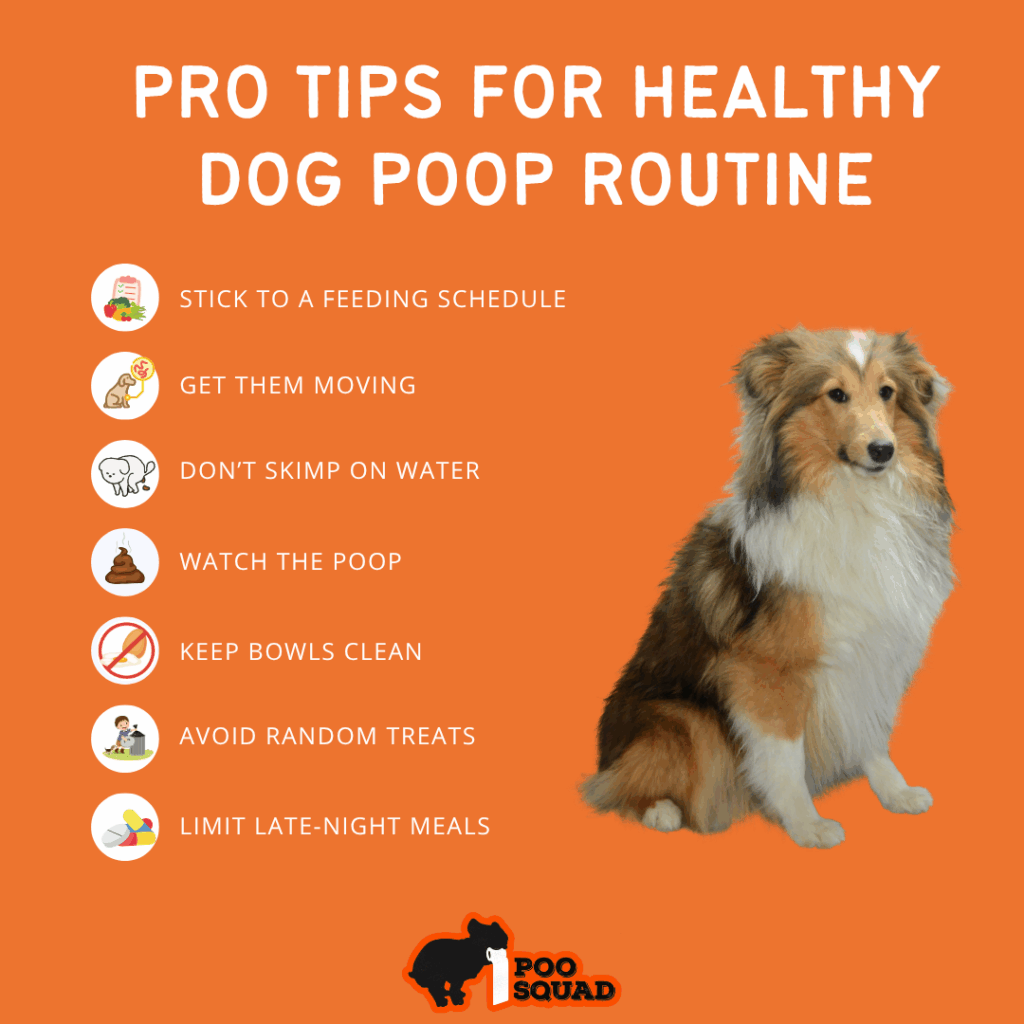
Stick to a Feeding Schedule
Feeding your dog at the same time each day helps regulate their poop schedule. Dogs thrive on consistency, and their gut does too. This also makes it easier for our team to spot when something’s off during routine cleanups.
Get Them Moving
A lazy dog often means a slow-moving digestive system. Walks, backyard playtime, and mental stimulation all help keep the bowels active. We’ve seen it all, from dogs who poop mid-zoomie to pups who hold it until they see our orange uniforms.
Don’t Skimp on Water
Make sure your dog is drinking enough, especially after meals or exercise. Dehydration is a sneaky cause of constipation, and dry stools are something our scoopers note frequently when clients skip hydration.
Watch the Poop Itself
Consistency, color, and size say more than frequency alone. Healthy poop should be brown, well-formed, and easy to scoop. If something looks strange, you’ll usually notice a pattern over time, or better yet, we will, and we’ll report it. Our Poop Report Card is like a wellness check built into every visit.
When to Call the Vet (And What to Look For)
Poop may not seem like a diagnostic tool, but it’s often the first sign your dog’s body is trying to tell you something. Knowing when to escalate from monitoring to a vet visit can make a real difference in catching issues early.
Signs You Shouldn’t Ignore
If your dog hasn’t pooped in over 48 hours, is straining, lethargic, or vomiting, it’s time to call the vet. The same goes for prolonged diarrhea, blood, or mucus in the stool. Don’t wait and see, better to be safe and catch it early.
Use What You’ve Observed
Keeping track of what your dog’s poop looks like is not weird, it’s smart. Bring pictures, note frequency changes, or even print your Poo Squad poop report if you have one. The more data you share with your vet, the easier it is for them to diagnose the issue.
Partner With Your Poop Pro
If you’re using our service, we’re already doing the heavy lifting. We’re in your yard weekly, we know what’s normal for your dog, and we flag anything unusual. You’re not alone in this, we’ve got your back (and your yard).
Let Us Handle the Dirty Work
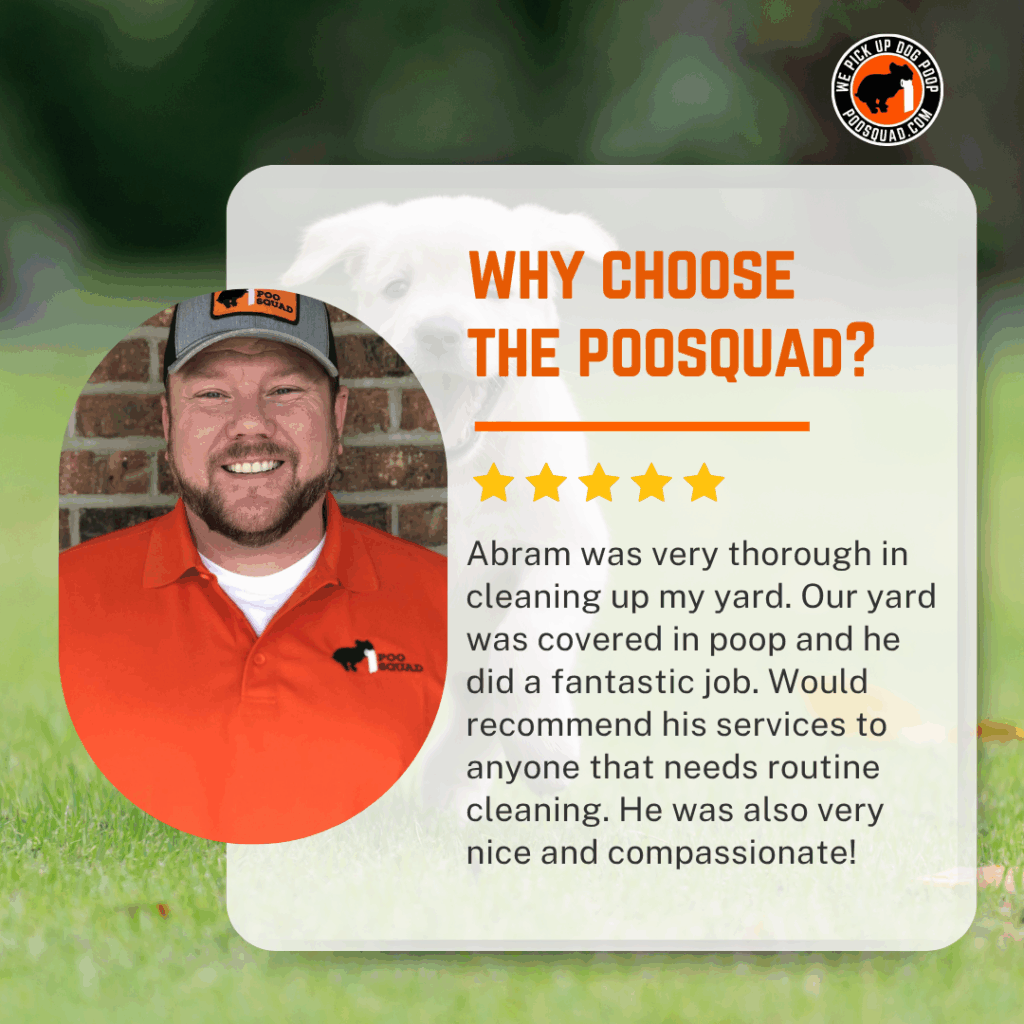
We’re more than a poop pickup service; we’re part of your dog’s care team. Every scoop is a chance to spot early health changes, keep your yard clean, and give you back your time (and your weekends). It’s why so many families trust us to do the job right, every single time.
Free Pet Profiles + Custom Dog Tags
We offer every client a complimentary pet profile and a personalized dog tag with a scannable QR code. If your pup ever goes missing, anyone who finds them can instantly reach you with a single tap. It’s safe and simple.
Sanitized Tools, No Trash Use, Ever
Our tools and shoes are disinfected between every yard. We never use your hose, and we don’t dump waste in your trash cans. Your yard stays clean, your home stays odor-free, and your dog stays safe from cross-contamination.
Trusted by Families Nationwide
From overwhelmed parents to mobility-limited seniors, we serve those who need us most. Our bright-orange crews show up on time, send reminders, and follow up with secure gate photos. That’s why busy moms across the country rely on us to keep their homes poop-free and worry-free.
Check out our full list of services to see how we can help make your life easier, one scoop at a time.
Dog Owner Questions Answered
You’re not alone in wondering what’s normal or when to be concerned. These are the kinds of questions our clients ask us every week during pickups, and the answers can give you the peace of mind (or nudge) you’ve been looking for.
Why Does My Dog Poop Immediately After Eating?
This is usually a healthy response called the gastrocolic reflex. It tells the digestive system to get moving when food hits the stomach. It’s especially common in puppies or dogs on high-fiber diets. If your dog always heads outside after a meal, they’re right on schedule.
Why Does My Dog Poop Twice During a Walk?
Some dogs save a second round for later in the walk. Movement stimulates digestion, and dogs with fast colons might need two stops. It’s not something to stress over, unless that second poop looks drastically different from the first, in which case our poop report might flag it for you.
Can I Reduce How Often My Dog Poops?
Yes, sometimes. Overfeeding is a common cause of frequent or bulky stools. Switching to a higher-quality food with better digestibility often reduces volume and frequency. If your pup is producing massive piles twice a day, it could be time to rethink the kibble.
Our team has seen it all; some dogs are walking compost bins. Others? Precision shooters. And each has a unique rhythm worth observing.
